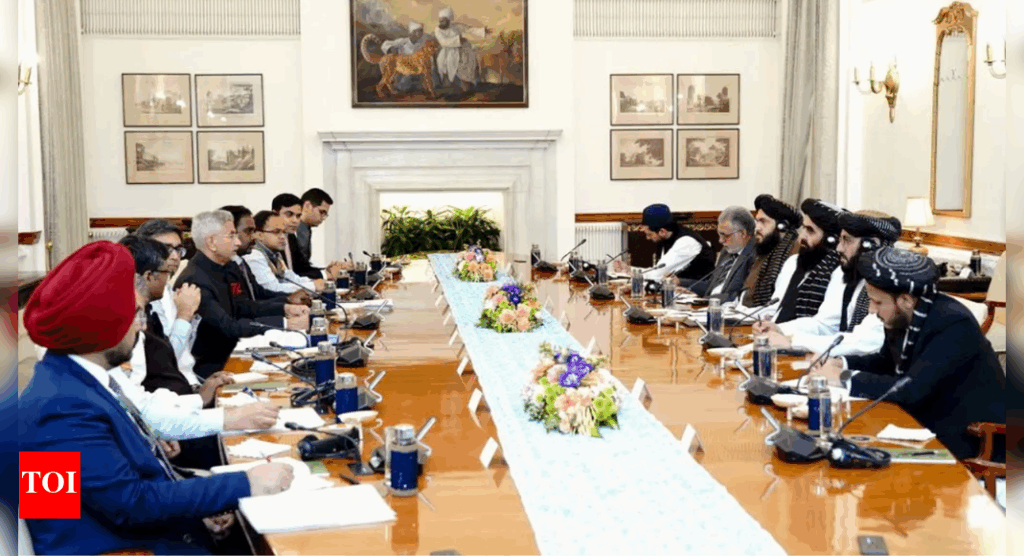
India is set to reopen its embassy in Kabul, elevating its technical mission to an embassy level. This significant diplomatic move follows a visit by Taliban Foreign Minister Amir Khan Muttaqi to New Delhi, marking a new chapter in India-Afghanistan relations. The announcement was accompanied by India’s pledge to initiate new projects and extend humanitarian aid to Afghanistan, underscoring a commitment to the nation’s sovereignty and regional stability.
The visit by Muttaqi saw India’s External Affairs Minister S. Jaishankar emphasizing cooperation between the two countries as a means to foster Afghanistan’s national development and enhance regional resilience. This diplomatic upgrade, while not a formal recognition of the Taliban regime, signifies a substantial step towards deepening economic ties and overcoming existing hurdles in bilateral relations.
Background and Recent Developments
India had previously closed its embassy in Kabul following the Taliban’s return to power in 2021. However, in June 2022, India stationed a technical team at the embassy to oversee the distribution of humanitarian aid. This latest development marks a shift in India’s approach, as it seeks to engage more directly with Afghanistan under the Taliban’s rule.
During the meeting, Jaishankar expressed concerns about cross-border terrorism, particularly activities linked to Pakistan-based terror groups. Muttaqi assured India that the Taliban would not permit any group to use Afghan soil against other nations. Both sides issued a joint statement condemning terrorism and advocating for peace, stability, and mutual trust in the region.
Economic and Humanitarian Initiatives
India announced a series of new projects aimed at boosting Afghanistan’s development. These include the reconstruction of residential buildings in earthquake-affected areas and the provision of material aid to Afghan refugees. Jaishankar highlighted India’s longstanding development partnership with Afghanistan, which has seen over 500 projects across all 34 provinces.
Muttaqi invited Indian companies to invest in Afghanistan’s mining sector, which could bolster bilateral trade and commercial relations. Jaishankar also announced the launch of six new projects, emphasizing India’s deep interest in Afghanistan’s progress as a neighboring country and a well-wisher of the Afghan people.
Healthcare and Education Initiatives
India’s commitment to Afghanistan extends to healthcare and education. Jaishankar announced the donation of 20 ambulances, MRI and CT scan machines, vaccines, and cancer medicines to Afghan hospitals. Additionally, India plans to establish a thalassemia center and five maternity health clinics.
In the realm of education, India aims to expand opportunities for Afghan students to study at Indian universities, offering more visas in medical, business, and student categories. This initiative is part of a broader effort to enhance cultural interactions, with a particular focus on sports, especially cricket, where Afghan talent has been notably impressive.
Regional Implications and Future Prospects
The decision to reopen the embassy and engage more closely with the Taliban has significant regional implications. It comes amid strained relations between the Taliban and Pakistan, largely due to the activities of the Tehreek-e-Taliban Pakistan (TTP). By strengthening ties with Afghanistan, India positions itself as a key player in regional stability and development.
Jaishankar’s remarks highlighted the shared threat of cross-border terrorism and the need for coordinated efforts to combat it. The visit and subsequent agreements reflect a mutual commitment to growth and prosperity, despite the challenges posed by regional dynamics.
Looking ahead, India’s renewed engagement with Afghanistan is likely to foster deeper economic cooperation and cultural exchange. As both nations navigate complex geopolitical landscapes, their partnership could serve as a model for regional collaboration and peace-building.
In conclusion, the reopening of India’s embassy in Kabul is more than a diplomatic gesture; it represents a strategic move to reinforce ties with Afghanistan and contribute to the broader goal of regional stability. As India and the Taliban continue to engage, the international community will be watching closely, hopeful for positive outcomes in this evolving relationship.





